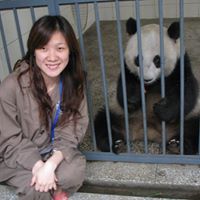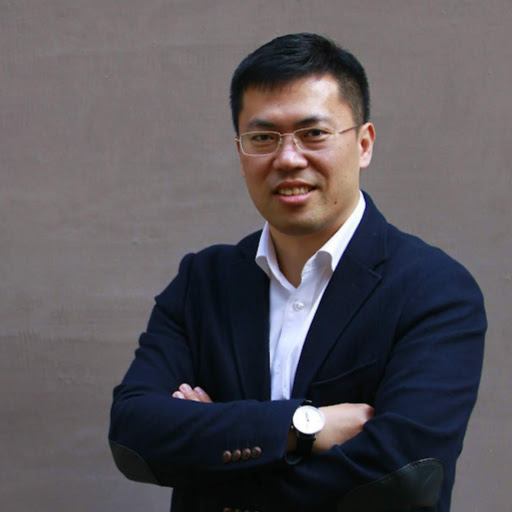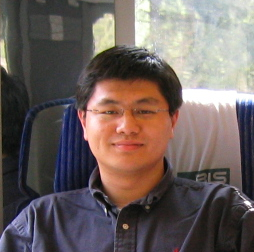Zhuo Y Chen
age ~51
from Hayward, CA
- Also known as:
-
- Zhuo Yue Chen
- Yue Chen Zhuo
- Zhuoyue Chen
- Zhou Chen
- Yue Chen Zhou
- Chen Zhou
- Phone and address:
- 768 Beryl Pl, Hayward, CA 94544
Zhuo Chen Phones & Addresses
- 768 Beryl Pl, Hayward, CA 94544
- Chehalis, WA
- Centralia, WA
- Daly City, CA
- 644 Niagara Ave, San Francisco, CA 94112
- Alameda, CA
Name / Title
Company / Classification
Phones & Addresses
President
TLC GLASS INC
Ret Paint/Glass/Wallpaper
Ret Paint/Glass/Wallpaper
1174 Bryant St, San Francisco, CA 94103
(415)8637600, (415)8637610
(415)8637600, (415)8637610
Vango Transportation and Sercives LC
Airport Shuttle and Limo Service
Airport Shuttle and Limo Service
2359 30 Ave, San Francisco, CA 94116
Nshl Capital, LLC
Art Design
Art Design
420 Judah St, San Francisco, CA 94122
6 Locksley Ave, San Francisco, CA 94122
787 11 Ave, San Francisco, CA 94118
6 Locksley Ave, San Francisco, CA 94122
787 11 Ave, San Francisco, CA 94118
Us Patents
-
Ensuring High Availablity Of Replicated Database Management Systems During Upgrades
view source -
US Patent:20220382742, Dec 1, 2022
-
Filed:May 28, 2021
-
Appl. No.:17/334570
-
Inventors:- San Francisco CA, US
Bharath Ram Manoharan - Pleasanton CA, US
Peter Thang Doan - San Francisco CA, US
Shivakarthik Subramanyam - Dublin CA, US
Zhuo Yao Chen - Needham MA, US
Paul Sydell - San Rafael CA, US
Swadesh Raj Bhattarai - Fremont CA, US -
International Classification:G06F 16/23
G06F 16/27
G06F 16/21
G06F 9/48
G06F 11/14 -
Abstract:An online system, such as a multi-tenant system ensures high availability of systems, for example, database management systems. The online system replicates the databases across multiple datacenters including: (1) a master node that receives read and write requests (2) a read-replica that receives only read requests and (3) a spare node that does not receive requests but acts as standby for high availability. One or more application servers may send read and write requests to the databases. The system performs a sweep of upgrades of the database nodes and also performs traffic quiescing of the requests received from the application servers to redirect the traffic across the database nodes as the upgrade sweep is orchestrated. The sweep of upgrades ensures that the availability of the database management system to the end users is maximized during the upgrade process.
-
Processing Overlapping Speech From Distributed Devices
view source -
US Patent:20210407516, Dec 30, 2021
-
Filed:Sep 13, 2021
-
Appl. No.:17/473645
-
Inventors:- Redmond WA, US
Andreas Stolcke - Berkeley CA, US
Zhuo Chen - Woodinville WA, US
Dimitrios Basile Dimitriadis - Bellevue WA, US
Nanshan Zeng - Bellevue WA, US
Lijuan Qin - Redmond WA, US
William Isaac Hinthorn - Seattle WA, US
Xuedong Huang - Bellevue WA, US -
International Classification:G10L 15/30
G10L 15/16
G10L 21/0208
G10L 21/0272 -
Abstract:A computer implemented method includes receiving audio signals representative of speech via multiple audio streams transmitted from corresponding multiple distributed devices, performing, via a neural network model, continuous speech separation for one or more of the received audio signals having overlapped speech, and providing the separated speech on a fixed number of separate output audio channels.
-
Customized Output To Optimize For User Preference In A Distributed System
view source -
US Patent:20200349230, Nov 5, 2020
-
Filed:Apr 30, 2019
-
Appl. No.:16/398836
-
Inventors:- Redmond WA, US
Andreas Stolcke - Berkeley CA, US
Zhuo Chen - Woodinville WA, US
Dimitrios Basile Dimitriadis - Bellevue WA, US
Nanshan Zeng - Bellevue WA, US
Lijuan Qin - Redmond WA, US
William Isaac Hinthorn - Seattle WA, US
Xuedong Huang - Bellevue WA, US -
International Classification:G06F 17/28
H04L 29/06
G10L 15/26
G10L 13/08 -
Abstract:Systems and methods for providing customized output based on a user preference in a distributed system are provided. In example embodiments, a meeting server or system receives audio streams from a plurality of distributed devices involved in an intelligent meeting. The meeting system identifies a user corresponding to a distributed device of the plurality of distributed devices and determines a preferred language of the user. A transcript from the received audio streams is generated. The meeting system translates the transcript into the preferred language of the user to form a translated transcript. The translated transcript is provided to the distributed device of the user.
-
Distributed Device Meeting Initiation
view source -
US Patent:20200349949, Nov 5, 2020
-
Filed:Apr 30, 2019
-
Appl. No.:16/399152
-
Inventors:- Redmond WA, US
Andreas Stolcke - Berkeley CA, US
Zhuo Chen - Woodinville WA, US
Dimitrios Basile Dimitriadis - Bellevue WA, US
Nanshan Zeng - Bellevue WA, US
Lijuan Qin - Redmond WA, US
William Isaac Hinthorn - Seattle WA, US
Xuedong Huang - Bellevue WA, US -
International Classification:G10L 15/26
H04R 1/40
H04L 29/06 -
Abstract:A computer implemented method includes receiving audio streams at a meeting server from two distributed devices that are streaming audio captured during an ad-hoc meeting between at least two users, comparing the received audio streams to determine that the received audio streams are representative of sound from the ad-hoc meeting, generating a meeting instance to process the audio streams in response to the comparing determining that the audio streams are representative of sound from the ad-hoc meeting, and processing the received audio streams to generate a transcript of the ad-hoc meeting.
-
Speaker Attributed Transcript Generation
view source -
US Patent:20200349950, Nov 5, 2020
-
Filed:Apr 30, 2019
-
Appl. No.:16/399166
-
Inventors:- Redmond WA, US
Andreas Stolcke - Berkeley CA, US
Zhuo Chen - Woodinville WA, US
Dimitrios Basile Dimitriadis - Bellevue WA, US
Nanshan Zeng - Bellevue WA, US
Lijuan Qin - Redmond WA, US
William Isaac Hinthorn - Seattle WA, US
Xuedong Huang - Bellevue WA, US -
International Classification:G10L 15/26
G10L 15/08 -
Abstract:A computer implemented method processes audio streams recorded during a meeting by a plurality of distributed devices. Operations include performing speech recognition on each audio stream by a corresponding speech recognition system to generate utterance-level posterior probabilities as hypotheses for each audio stream, aligning the hypotheses and formatting them as word confusion networks with associated word-level posteriors probabilities, performing speaker recognition on each audio stream by a speaker identification algorithm that generates a stream of speaker-attributed word hypotheses, formatting speaker hypotheses with associated speaker label posterior probabilities and speaker-attributed hypotheses for each audio stream as a speaker confusion network, aligning the word and speaker confusion networks from all audio streams to each other to merge the posterior probabilities and align word and speaker labels, and creating a best speaker-attributed word transcript by selecting the sequence of word and speaker labels with the highest posterior probabilities.
-
Processing Overlapping Speech From Distributed Devices
view source -
US Patent:20200349954, Nov 5, 2020
-
Filed:Apr 30, 2019
-
Appl. No.:16/399175
-
Inventors:- Redmond WA, US
Andreas Stolcke - Berkeley CA, US
Zhuo Chen - Woodinville WA, US
Dimitrios Basile Dimitriadis - Bellevue WA, US
Nanshan Zeng - Bellevue WA, US
Lijuan Qin - Redmond WA, US
William Isaac Hinthorn - Seattle WA, US
Xuedong Huang - Bellevue WA, US -
International Classification:G10L 15/30
G10L 15/16
G10L 21/0208
G10L 21/0272 -
Abstract:A computer implemented method includes receiving audio signals representative of speech via multiple audio streams transmitted from corresponding multiple distributed devices, performing, via a neural network model, continuous speech separation for one or more of the received audio signals having overlapped speech, and providing the separated speech on a fixed number of separate output audio channels.
Lawyers & Attorneys

Zhuo Chen - Lawyer
view sourceAddress:
Yingli Green Energy
Licenses:
New York - Currently registered 2008
Education:
Harvard Law School
Resumes

Zhuo Chen
view source
Zhuo Chen
view source
Student At University Of California, Berkeley
view sourceLocation:
San Francisco Bay Area
Industry:
Management Consulting

Zhuo Chen San Francisco, CA
view sourceWork:
Flatter Than Earth
Oct 2014 to 2000
3D Environment Artist
Oct 2014 to 2000
3D Environment Artist
Education:
Academy of Art University
San Francisco, CA
2011 to 2014
Master in Game Design
San Francisco, CA
2011 to 2014
Master in Game Design
Skills:
Hand Painted texture, 3D Modeling, Environment Design, Level Design

Zhuo Chen
view source
Zhuo Chen
view source
Zhuo Chen
view source
Zhuo Kuan Chen
view source
Zhuo Yi Chen
view source
Zhuo Chen
view source
Zhuo Chen
view source
Zhuo Chen
view sourcePlaxo

Zhuo Kuan Chen
view sourceya at Development
Classmates

Zhuo Chen
view sourceSchools:
Holy Child High School Old Westbury NY 1997-2001

Zhuo Fu Chen
view sourceSchools:
New York High School For Economic & Finance New York NY 2006-2010

Holy Child High School, O...
view sourceGraduates:
Lorraine Habedank (1989-1993),
Dina Hanjis (1993-1997),
Jennfer Vlamis (1990-1994),
Zhuo Chen (1997-2001),
Claire Kevill (1965-1969)
Dina Hanjis (1993-1997),
Jennfer Vlamis (1990-1994),
Zhuo Chen (1997-2001),
Claire Kevill (1965-1969)

New York High School For ...
view sourceGraduates:
Zhuo Fu Chen (2006-2010),
Dan Fisher (1994-1998),
Jose Hernandez (1998-2002),
Nic Jones (1980-1984),
Kevin Braithwaite (1997-2001)
Dan Fisher (1994-1998),
Jose Hernandez (1998-2002),
Nic Jones (1980-1984),
Kevin Braithwaite (1997-2001)
News

Study traces evolution of acoustic communication
view source- evolution of acoustic communication across terrestrial vertebrates, John J. Wiens of the University of Arizona and Zhuo Chen, a visiting scientist from Henan Normal University in Xinxiang, China, traced the evolution of acoustic communication in terrestrial vertebrates back to 350 million years ago.
- Date: Jan 17, 2020
- Category: Science
- Source: Google

Black hole at the center of our galaxy appears to be getting hungrier
view source- currently at Germany's Max Planck Institute for Radio Astronomy; Mark Morris, UCLA professor of physics and astronomy; Eric Becklin, UCLA professor emeritus of physics and astronomy; Rainer Schoedel, a researcher at Spain's Instituto de Astrof?sica de Andaluc?a; and UCLA graduate students Zhuo Chen
- Date: Sep 11, 2019
- Category: Science
- Source: Google
Flickr
Googleplus

Zhuo Chen

Zhuo Chen

Zhuo Chen

Zhuo Chen

Zhuo Chen

Zhuo Chen

Zhuo Chen

Zhuo Chen
Youtube
Myspace
Get Report for Zhuo Y Chen from Hayward, CA, age ~51














